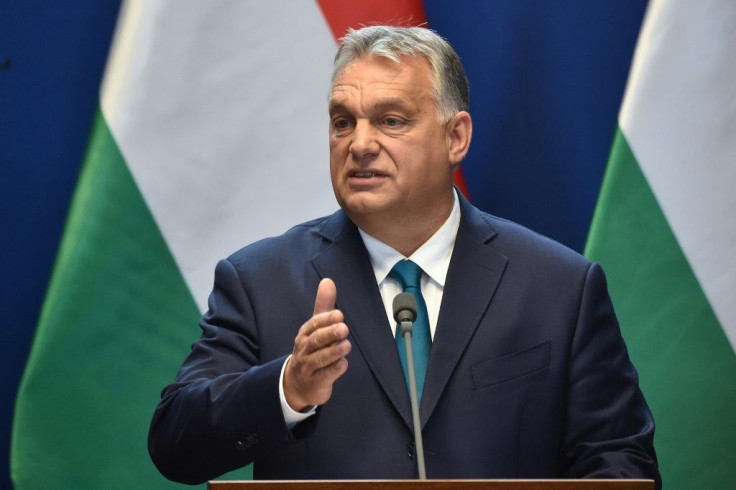Hungary On Arms Buying Spree To Upgrade, Modernize Its Military, Secure Borders

KEY POINTS
- Hungary was Germany top weapons buyer last year
- Hungary plans to spend 2% of GDP on defense by 2023
- Viktor Orban has placed security, defense as his top priority
Hungary, a country with less than 10 million people, was the top buyer of Germany’s arms and weapons last year.
Germany's ministry of economics said it authorized total arms sales of a record $8.8 billion in 2019, with Hungary accounting for about $1.97 billion of that amount.
Hungary is on an arms spending spree to fulfill the wishes of its Prime Minister Viktor Orban to modernize and upgrade his country's military and to double defense spending.
Hungary, a member of the North Atlantic Treaty Organization, or NATO, said it seeks to reach its defense spending goal – that is, to spend 2% of its economic output on its military, up from less than 1% only a few years ago -- by 2023, one year ahead of the deadline imposed by its allies.
Foreign Minister Peter Szijjarto said Hungary will primarily purchase weaponry and equipment from Turkey, France, Germany and the Czech Republic.
“I really understood the position of [U.S.] President [Donald] Trump because he wanted Europeans to spend more, to put more emphasis on their security,” Szijjarto said. “We have been implementing a very significant and robust modernization strategy of our armed forces, which will last until 2026. We will hit the 2% [level] in 2023.”
At present, only seven NATO states meet or exceed the 2% defense spending target - the U.S., Britain, Greece, Poland, Latvia, Lithuania and Estonia.
Szijjarto also said Hungary seeks to purchase missiles and armored vehicles.
Defense ministry state secretary Szilard Nemeth asserted that Hungary’s security will remain a top priority for the Budapest government, including a plan to make the Hungarian army the strongest and most effective armed force in this region.
Nemeth said that this year’s central budget allocates $2.07 billion to defense spending, a $345 million increase over the prior year. He noted that that 30% of these funds are earmarked for development projects, 10% more than mandated by NATO.
Nemeth also said that since 2010, when Orban assumed power for a second time, the government “has laid the foundations of rebuilding the country’s totally dilapidated defense industry.”
By 2026, Hungary aims at achieving an armed comprising 30,000 professionals and 20,000 reservists.
However, Nemeth squelched rumors the government wants to impose a draft.
"There will be no conscription in Hungary,” he said. “The personnel of the Hungarian Defense Forces will remain based on the career soldier model and the system of voluntary reservists also in the future.”
Hungary is purchasing weaponry for various purposes.
For example, Rheinmetall, a German defense contractor, recently obtained a $334 million contract to manufacture armament, fire control technology and hulls for the Hungarian Army’s PzH 2000 self-propelled howitzer and Leopard 2 main battle tank. The company will also produce chassis for the howitzers.
Under the contract, deliveries will occur between 2021 and 2025.
Nemeth said Hungary will also buy Swedish Carl Gustav hand-held anti-tank weapons.
The Hungarian military added four new H145M helicopters made by Airbus last year. These helicopters cost about $9.7 million each. Hungary wants to purchase 12 more helicopters in 2020 and another four in 2021.
The Hungarian government also plans to double the number of soldiers who patrol its borders “in light of increasing migration pressure,” said Nemeth.
Last year, the number of illegal migrants entering Hungary doubled – and authorities expect these figures to keep increasing. Hungarian soldiers have been patrolling the borders, especially the southern boundary, with police officers since 2015.
Brigadier-General Laszlo Garas of the Hungarian Armed Forces said drones and helicopters are also being deployed in reconnaissance to secure the country’s borders.
The comprehensive strategy of upgrading Hungary’s military on many fronts reflects Orban’s long held plan to make Hungary a formidable nation with high emphasis on security and defense.
Orban has even called for military instruction to be provided to children as a means of encouraging the patriotism and social cohesion.
In a May 2018 speech Orban said his government’s greatest priority was to strengthen national security.
“We want a modern, combat-ready army committed to its homeland: one which can stand comparison with the armed forces of any other nation,” he said. “Our neighbors are continuously and dynamically improving their military capabilities.”
Orban added: “History teaches us that a nation which is unable to protect its country is not worthy of it. A strong Hungary cannot exist without a strong army. To make our army strong again, however, we must first win young people over to the cause of defense.”
© Copyright IBTimes 2024. All rights reserved.





















